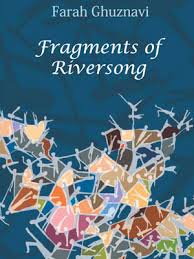by Susmita Bhattacharya
After a long wait, short stories have finally found a place of their own in the literary world. Alice Munro winning the Nobel Prize for Literature champions the short story form. Lydia Davis upholds the Man Booker International Prize for her short fiction. At last, there is recognition and importance given to stories that do not weave their way into full length novels.
There has been a burgeoning of talented short story writers in English, and Bangladeshi writer Farah Ghuznavi is a name to reckon with. Her short stories have appeared in various Bangladeshi and international publications, and she has been highly commended in the Commonwealth Short Story Prize. Fragments of Riversong is her first collection of short stories.
The themes of the stories are varied, and the genres stretch from literary to flash fiction to science fiction. There are twelve stories in total, and each of them touches a fragment of humanity, a sliver of life which we, the readers, no matter what part of the world we come from or reside in, can find familiarity with. Ghuznavi does not shrink back from difficult issues such as child abuse and political agenda. Her work with the British NGO Christian Aid, the Grameen Bank in Bangladesh, and the United Nations has inspired her to write about themes she experienced through her profession. She says: I began writing fiction because I felt it important to tell many of the stories of people I’ve encountered in my life as a development worker, who sometimes aren’t in a position to tell their own stories.’ (The Missing Slate).
Big Mother is Lali’s story. A young girl made to feel inadequate in her own home simply because she is a female child. She gets a job in a garment factory; finds acceptance and love. It is set against the backdrop of Bangladesh’s most recent disaster of the Rana Plaza collapse. We are taken into the heart of a young woman who loses her love, her future to the corruptness of the international garment industry, and yet she emerges stronger and forges her own path to a better future. In Escaping the Mirror, Dia, a well-to-do schoolgirl, is abused by her family chauffeur, and cannot ask for help from her parents as she is convinced she is the one at fault.
Ghuznavi’s talent is in expressing the thoughts and language of young children so accurately. Many of her stories explore life through the point of view of a child. These are stories of abuse, bullying, bereavement, but also refreshingly innocent and coming-of-age stories such as the Guava Tree Rebellion, which delves into the relationships children have with their grandparents.
Usually Nawara’s time with Nanu was spent playing games, or listening to stories. During rainy afternoons, the two of them sat on the verandah, with the board for Ludo or Snakes and Ladders laid out… where Nanu’s competitive spirit emerged in all its glory. Her grandmother, Nawara felt, took an inordinate glee in chasing after her cowering tokens. Nanu would crow wickedly whenever Nawara landed on a snake as well.
One can feel the thrill of licking an ice-cream on a sultry day in Waiting, where a stranger buys ice-creams for two children begging on the streets of Dhaka. And the heartbreak when Hashem ‘folded the ice-cream wrappers, carefully placing them for later; there were always remnants to be found on the paper. That was how he and Raya knew what Choc-bars tasted like’.
Fragments of Riversong is a sensitive and inspiring collection of short stories that allows us to look into Bangladesh and her people, rooting for them when they stumble and laughing with them when they strive and Farah Ghuznavi presents these life stories with authenticity and a passion for both her country and her love of writing.
Fragments of Riversong is published by Daily Star Books, October 2013


